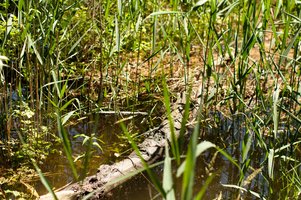Constructed wetlands with biofilters (so-called mini-wetlands) can be effective measures to reduce nitrogen and phosphorus emissions from field drains to the aquatic environment.
Results from trials with pilot systems show that mini-wetlands can reduce the annual loss of nitrogen to the aquatic environment from drains by 45-60 percent depending on the type of filter. Hence, mini-wetlands may be installed in large numbers due to the demand for lowering the nutrient leaching from agriculture to streams, rivers and marine waters.
Members of the Centre for Water Technology have experimental installations operated at Bioscience, Silkeborg (by the research group of senior researcher Carl C. Hoffmann) and at Agroecology, Foulum (by the research group of senior researcher Finn Plauborg).
Research activities aim to establish and strengthen the knowledge base for evaluation of the nutrient removal and the cost effectiveness for mini-wetlands as an instrument to reduce nutrient emissions from agriculture.
Long-term effects in already established mini-wetlands as well as new systems are studied to acquire extensive research-based knowledge about the effect on nitrogen and phosphorous removal as a function of the primary controlling variables, including hydraulic conditions.
Foto this page by: Colourbox

